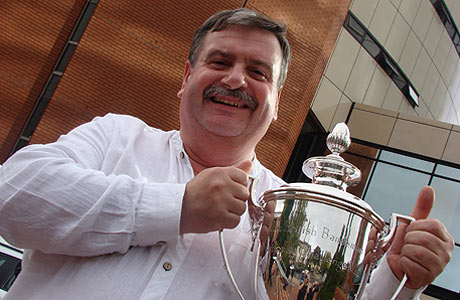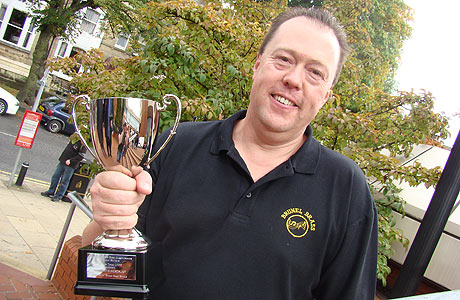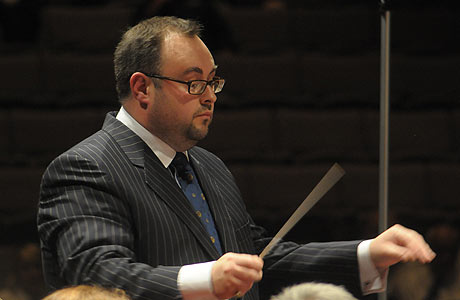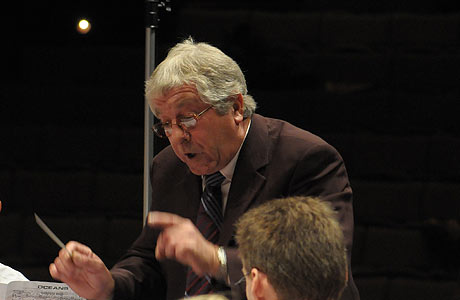2009 Lower Section National Finals - Third Section: retrospective
30-Sep-2009Just three years after their formation, Brunel Brass steamed to victory in a cracking Third Section contest.

Steaming ahead: John Winterflood enjoys that winning feeling
Picture: Rob Fletcher
There was plenty of quality to be enjoyed in the Third Section Final that took place on Sunday morning.
Ambitious
Goff Richards’ ‘Oceans’ seemed an ambitious choice given it was a championship test piece when it was first written 25 years ago, but each of the 17 competitors delivered performances of merit, with the best of a standard that would have taken more than a few top section scalps a quarter of a century ago.
Although now seriously ill, Goff was in the audience to hear all the bands, and it must warmed the cockles of his heart to enjoy a raft of well balanced, vibrant renditions that benefited from MDs who engaged in neutral readings and players who obviously relished his challenging mix of the lyrical and rhythmic.
Difficult task
Robert Childs and Ray Farr certainly enjoyed the experience in the box and would have had a difficult task separating the bands out throughout the prize list. Bob did say there were three distinct groups in terms of overall performance and it was hard to disagree with the observations.
The best
The best – a group of six or seven, had the stamp of basic competency firmly in place: Decent intonation (the one bug bear for the judges throughout the contest it must be said), warm intonation, balanced ensemble and secure soloists.
It’s not rocket science at this level. Get those ingredients right and you will be in the mix come the results – all these bands did.
Finesse
What separated the best from the rest though was that extra touch of finesse – the ability to add a touch of polish to individual lines (none more so than ‘Best Instrumentalist’ winner Paul Richards on soprano for Brunel Brass) and sheen to ensemble delivery.
The best MDs were also able to inject a confident brio in the more rhythmic sections and allow enough meter in the lyrical interludes for the subtle shaping of phrasing.
Credit
The bands that finished in the middle portion of the results also emerged with credit – more plus points than minus ones for sure.
Here the basics did have fragility and inconsistent execution, but once again the common sense of the MDs made sure that they made the most of their resources (there was camouflage work undertaken that top section bands would be proud of).
The bands in the final third did struggle, but never to the point that the piece totally defeated the MDs or the players. Even those bands that did finish towards the bottom emerged with credit and a real sense of musical achievement – the piece stretched them to their limits, but none really buckled.
Intelligent direction
For Brunel Brass, their meteoric rise to banding prominence continues. With an eclectic mix of ages and experience, John Winterflood has moulded a compact and balanced ensemble under his wing – one that benefits greatly from his intelligent direction.
Here they produced a high class account, not without error, but unmistakable quality from start to finish, with a lovely mix of the grand and gripping. There were not many in the audience who were not impressed, and it came as little surprise that they would end up right in the mix come the results.

Touch of class: Paul Richards of Brunel takes the Best Instrumentalist Award
Picture: Rob Fletcher
Vibrant
Just behind came the chasing pack, led by North Skelton under Tim Oldroyd. As the last band on the day the North East outfit pulled a cracker from the hat, exciting, purposeful and vibrant (and not just that great timp player either).
It didn’t quite have that ensemble quality of the winners, but it came very close indeed in the opinion of the judges.
The one band that did surprise a few was Cubbington Silver, who squeezed into the final podium slot under the baton of Gary Smallwood.
It was certainly the boldest approach of the day – big and powerful, and a touch idiosyncratic from the MD, but there was something about it though, capturing a real sense of bravura and colour.
Although it passed a few listeners by, it certainly caught the ears of the judges, and that was all that counted.

Cultured appearance: Tim Oldroyd leads North Skelton to the runner up spot
Picture: Rob Fletcher
Top six
The remaining top six places were taken by Douglas Town, Coalburn and Royal Buckley, with the Scots of Coalburn a touch unlucky that their controlled and very musical performance didn’t make it into the top three, and even victory. They had to be content with 5th place.
Gareth Bowman’s lead from the front was excellent and with solid soloists and compact ensemble there was little that seemed to go wrong. Perhaps the early draw worked a little against them (although given the result that could be disputed), but it was a marker that few, if any, managed to emulate all day.
Douglas Town meanwhile gave the type of performance that had the hallmarks of good preparation and intelligent direction about it from start to finish.
Gordon Higginbottom just let the music flow, and whilst it was a touch businesslike, the business in question was to get in the prizes – and they more than justified that to come 4th.
That just left Royal Buckley’s all bells and whistles 6th place performance under Paul Lovatt-Cooper, which was high on the excitement (with the troms standing on verbal command towards the end) and vibrant intent – even in the quieter sections of the piece. The clips were there though – sometimes very noticeable, and that was the difference between them and a higher placing on the day.
Missed out
The bands which just missed out on a mention from the stage could each put up a persuasive argument in their favour to being a tad unlucky, with Lostock Hall in particular just getting the wrong end of the results stick.
Theirs was a top notch effort, again, not perfect in execution by any means, but one that brought the music to life, even if they did fade badly in the final few bars.
We had them in the mix, but not so the judges, but it was a performance of rich promise and merit (and three cracking young percussionists).
Solid
The same could be said of Crofton, Bugle and Dobcross, all of whom brought the music to life with solid ensemble playing and soloists who played with confidence.
Crofton will know that their high error rate counted against them after a performance that had all the essential elements in place for it to have featured in the prizes. If only they could have been a bit cleaner in execution.
Bugle meanwhile went for it with a touch too much aggression, and whilst the playing was generally secure, a lighter touch may have proved more beneficial.
Dobcross were the opposite, with a very individual reading of neat style and breadth from Grenville Moore seemingly set for a higher finish before tiredness crept in and they faded in the final sections. It was the ‘nearly a cracker’ performance of the day.

Smallwood, big prize: Gary Smallwood gets Cubbington into the prizes
Picture: Rob Fletcher
No complaints
That left the bottom seven bands, and although some will have been disappointed with their end result, none could have had too many complaints given the high standard set by the best of their rivals.
Hungerford and South Milford delivered enjoyable musical portraits, although both were a bit of a mixed bag in terms of technical presentation. The plus points did outweigh the minus ones though, with both MDs knowing their band’s limits.
The same went for Dunfermline and Bakewell too, with performances that had extended periods when the basics came together well. It was a bit hit and miss though, especially from the Scots, whilst the Midlanders may well reflect on some ambitious choices of tempi that seemed to rob their ensemble clarity.
Bottom three
The bottom three of Garforth, Ynyshir and St Sebastian Wokingham will reflect on performances that perhaps didn’t live up to pre contest expectations.
Each struggled with the technical obstacles placed in the score, and whilst the MDs kept a sensible rein on the dynamics and the tempi, those inherent basic problems consigned them to the lower reaches of the prize list.
All three though will have gained considerable benefit from playing the piece and in performing here on the weekend, even if the Welsh band will not want to draw number 1 again and have wait for a gymnastic pensioner to finish off his backward roll downstairs before they could start.
National title
For the winners, a National title just three years after their first rehearsal.
What the next three years will bring is anyone’s guess, but given that Brunel has already got close to 80 new players in their organisation, the future looks bright. They are a band to watch out for.
Iwan Fox















